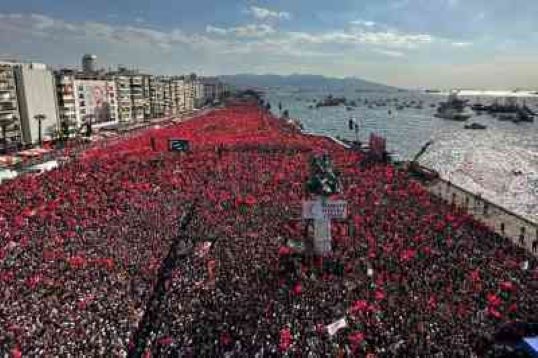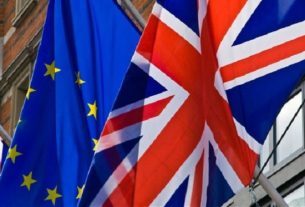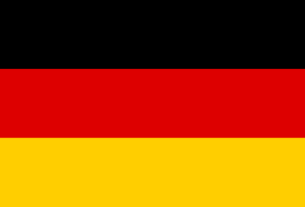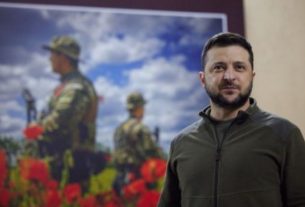Turkey’s all-powerful President Erdogan is in the fight of his life against an opposition that has united against him for Sunday’s elections.
His main rival, Kemal Kilicdaroglu, appeared before a throng of supporters on Friday, flanked by allies from across the political spectrum who have come together as never before.
As the rain beat down in Ankara, he vowed to restore “peace and democracy”.
The man he wants voters to oust after 20 years – Recep Tayyip Erdogan – said he had kept Turkey standing tall despite many challenges, including the economy with its rampant inflation and February’s catastrophic double earthquakes.
Both issues have dominated this febrile campaign for both the presidency and parliament.
At 74, the opposition leader is often described as soft-spoken, but he gave a powerful speech to an audience that believes this is their best hope so far of reclaiming power from a president who has dramatically increased his own at the expense of parliament.
Mr Kilicdaroglu is slightly ahead in the opinion polls and his supporters have dared to dream he might win outright on Sunday, with more than 50% of the vote, rather than face a run-off two weeks later.
Asked on TV what he might do if he lost, President Erdogan said the question was absurd, but that his government had come to power democratically: “If our nation changes its mind, we will do exactly what democracy requires.”
Firat, one of five million first-time voters, said he was delighted at conservatives and nationalists appearing on the same platform as the head of the centre-left Republican People’s Party (CHP).
Here was nationalist Meral Aksener, the only female leader in the six-strong alliance, and there was Temel Karamollaoglu, who fronts the pro-Islamist Felicity party.
Mr Kilicdaroglu’s party is secular to the core, but he has worked hard to reach out to women who wear the headscarf. The six parties have rallied under the slogan Haydi (Come on!) and a campaign song of the same name.
Tensions are running so high ahead of the vote that he wore a bullet-proof vest on stage in Ankara for his final rally and at another event earlier on.
The race has become as tense as it is pivotal. One of the four candidates for the presidency, Muharrem Ince, pulled out on Thursday, complaining that he had been targeted on social media with deepfake sex videos that had “manipulated the electorate”.
When the main opposition challenger blamed Russia, the Kremlin denied having anything to do with the videos or seeking to interfere in the vote.
Mr Erdogan, who has maintained ties with Vladimir Putin, warned his rival: “If you attack Putin, I will not be OK with that.”
The president was addressing party loyalists in Istanbul, but the night before, he was just outside the capital in a city of half a million people that seemed in full support of his AK Party.
Orange, blue and white party AKP flags fluttered throughout the centre of Sincan, as locals filled the streets in the hope of catching a glimpse of Mr Erdogan.
Supporters chanted party songs as they waited for the president to show up on stage in a green jacket. One chorus rang out repeatedly: Re-cep Tay-yip Er-do-gaaaan.
“We built schools, universities and hospitals… we changed the face of our cities. We extracted our own natural gas and oil,” Mr Erdogan told thousands of cheering supporters.
His strategy, first as prime minister but then as president, has been to build growth, often through big-ticket construction projects that are visible in many of the big cities, but not so obvious in Sincan.
Although his party still commands strong support, he relies on the backing of the nationalist MHP and other smaller groups in his People’s Alliance.
His greatest support comes mainly from conservative or nationalist Turks, and he has aimed his rhetoric not just at the West, which he accuses of going against him, but at the LGBT community too.
“The AK Party does not allow LGBT people into its neighbourhood, and the MHP does not allow them into the People’s Alliance, because we believe in the sanctity of a family.”
These political alliances have become essential under Turkey’s political system, as a party needs 7% of the national vote to get into parliament, or be part of an alliance that does.
Whoever wins the presidency will need to have sufficient support in parliament to back their plans.
On the campaign trail in Ankara, centre-left candidate Aysun Palali Koktas said that while the economy and the aftermath of the earthquake were the top two issues of the election, the future of Turkey’s democracy and people’s rights were just as important.
“When we tweet, we don’t want to be frightened, and that’s the case especially for young people,” she said.
But, AK Party candidate Zehranur Aydemir, 25, believes young voters are very well treated by the government. “You can see young people at every level in our party.”
More than 64 million people are expected vote at home and abroad on Sunday.
To win outright, a candidate will have to secure more than half the vote.
If no candidate gets at least 50% plus one vote in the first round, the presidential election will go to a second round on 28 May between the two who received the most votes.__BBC.com





